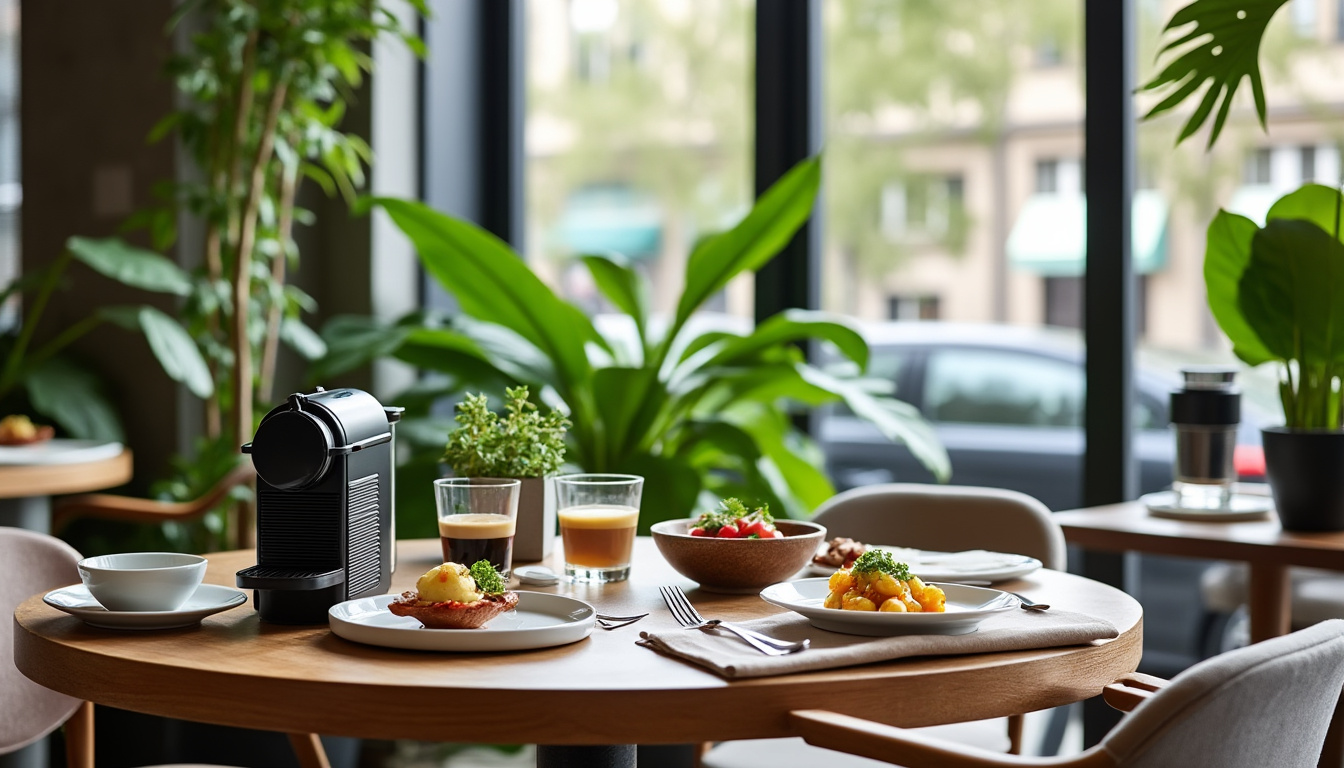In an era where sustainability is not just an option but a necessity, Nespresso and Le Fooding have joined forces to redefine the Parisian dining landscape with Zéro Carbo — an innovative dining event committed to carbon neutrality. Set against the bustling urban backdrop of Paris, this initiative transcends traditional gastronomy by embedding ecological responsibility at its core. Zéro Carbo offers diners an immersive encounter with meticulously crafted menus designed to minimize carbon footprints, championing local sourcing and waste reduction. This partnership is a tangible demonstration of how culinary excellence can harmonize with environmental stewardship in a world progressively attuned to climate challenges.
Nespresso’s Pioneering Role in Sustainable Coffee and Carbon-Neutral Dining
Nespresso’s commitment to sustainability extends far beyond its globally recognized coffee capsules. As part of Nestlé’s broader environmental strategy, Nespresso has been a forerunner in integrating carbon neutrality across its operations. Since launching the AAA Sustainable Quality Program in 2003, Nespresso has worked directly with coffee farmers worldwide through partnerships with Fairtrade International and various sustainability organizations to ensure high-quality coffee production aligns with environmental preservation and social equity.
In 2025, this commitment hasn’t wavered. Nespresso now plants approximately 500,000 trees annually in coffee-producing regions, a decisive effort to offset emissions and restore biodiversity. This proactive approach ensures that every sip of Nespresso coffee consumed in France carries a 100% carbon-neutral guarantee, reinforcing the company’s leadership in sustainable business practices.
Transitioning from coffee to cuisine, Nespresso’s collaboration with Le Fooding’s Zéro Carbo concept extends this ethos to sustainable dining. The event exemplifies how luxury and ecological mindfulness can coexist, showcasing menus where every ingredient’s footprint is meticulously calculated and minimized. This initiative offers a blueprint for the fine dining scene worldwide, integrating sustainability with gastronomic artistry without compromising taste or experience.
- Carbon neutrality achieved through reduction and compensation methods.
- Integration of Fairtrade standards ensuring equitable coffee sourcing.
- Annual reforestation projects directly benefiting coffee-growing communities.
- Innovation in sustainable packaging via partnerships with BioPak and other eco-friendly suppliers.
- Education and awareness initiatives to engage consumers on environmental impacts.
| Initiatives | Description | Impact |
|---|---|---|
| AAA Sustainable Quality Program | Supports farmers in sustainable coffee farming | Improved livelihoods and reduced environmental footprint |
| Carbon Neutral Coffee | Offsetting emissions through reforestation and development projects | Every cup consumed is carbon neutral in France |
| Eco-friendly Packaging | Use of compostable and recyclable materials via BioPak | Reduction of plastic waste and environmental pollutants |
Le Fooding’s Vision: Redefining Sustainable Gastronomy in Paris
Le Fooding, recognized for its dynamic role as gastronomic agitators, have made sustainability a cornerstone of their mission to reshape French culinary culture. Their collaboration with Nespresso on Zéro Carbo embodies a radical shift: moving from overconsumption and waste toward a model emphasizing seasonality, local sourcing, and zero waste.
At its core, Le Fooding’s vision embraces the following principles for sustainable dining:
- Seasonal and Local Produce: Harnessing the earth’s natural cycles by focusing on ingredients sourced within a 40 km radius around Paris, which drastically reduces transport emissions and supports regional farmers.
- Zero Waste Philosophy: From kitchen operations to serving practices, the event pioneers techniques to minimize food waste and encourages composting through partnerships with organizations like Too Good To Go.
- Community Engagement: Educating diners on the environmental impact of their food choices, empowering them to become part of the climate solution.
- Promotion of Plant-Based Options: Inspired by innovators like Impossible Foods and Oatly, the menus emphasize reduced meat and dairy consumption to lower overall emissions.
- Transparency and Accountability: Detailed carbon footprint assessments are shared with diners to promote awareness and collective responsibility.
Le Fooding’s approach also includes meticulous selection of venues, ensuring they are tucked away from polluted urban centers to offer an authentic experience in harmony with nature. The event’s location in Paris’s 20th arrondissement, near a green haven that contrasts the city’s usual hustle, reinforces this ethos.
| Sustainable Dining Principle | Implementation Strategies | Expected Outcomes |
|---|---|---|
| Seasonal Local Produce | Procuring food from farms like Ferme du Doyenné within close proximity | Lower transport emissions and support local economy |
| Zero Waste | Use of leftover vegetable parts to create broths and pickles | Reduction in landfill waste and food discards |
| Plant-Based Emphasis | Dishes featuring perilla leaves and vegetables from parent’s garden | Lower carbon emissions and a healthier diet |
Chefs and Mixologists Driving the Zéro Carbo Experience with Local and Ethical Ingredients
The success of Zéro Carbo hinges on the dedicated work of artisan chefs and mixologists committed to gastronomic excellence and sustainability. James Edward Henry and Franck Baranger are two culinary leaders whose practices epitomize farm-to-table philosophies and zero waste principles, delivering menus rooted in respect for the environment and natural flavors.
James Edward Henry, hailing from Australia and now a luminary in the Île-de-France culinary scene, combines locavorism with refined culinary technique. His recent projects, including the Ferme du Doyenné farmhouse, emphasize growing and harvesting vegetables within a close radius that maintain freshness and minimize carbon emissions.
Conversely, Franck Baranger, a Paris-born chef celebrated for his eco-conscious bistronomy, sources produce from both regional farms and his family’s garden in Vendée. His commitment extends to waste management, prioritizing composting and full utilization of ingredients, reinforcing a closed-loop kitchen.
- Artisanal Techniques: Utilizing whole vegetables and herbs, including peelings and stems, for broths and garnishes.
- Ethical Sourcing: Collaboration with small-scale, organic farmers and producers to ensure product integrity.
- Seasonal Menus: Flexibility to adapt dishes based on availability and freshness of local harvests.
- Low Carbon Cooking Methods: Use of energy-efficient appliances and reduction of meat-heavy recipes.
- Innovative Beverage Pairings: Mixologists Marie and Chirine Cabaret-Besenval create cocktails using Nespresso’s Fairtrade coffee and seasonal produce to complement the menu sustainably.
| Experts | Contributions | Signature Ingredients |
|---|---|---|
| James Edward Henry | Farm-to-table dishes from Ferme du Doyenné | Seasonal vegetables, perilla leaves, fig brioche |
| Franck Baranger | Eco-conscious bistro menus | Garden vegetables, composted waste ingredients |
| Marie & Chirine Cabaret-Besenval | Cocktail innovation with coffee and local produce | Nespresso Colombia Fairtrade coffee, rhubarb, beetroot |
Innovative Partnerships Amplifying Sustainable Food Movements: From BioPak to Too Good To Go
Zéro Carbo’s ambitious goal of carbon-neutral dining is strengthened through collaborations with cutting-edge companies and organizations advocating for environmental responsibility in food consumption. Notably, partnerships with BioPak, Too Good To Go, and Impossible Foods underline the multifaceted approach to tackling sustainability challenges.
BioPak, a global leader in sustainable packaging, provides the event with compostable and biodegradable materials, diminishing plastic waste that often plagues food service industries. This choice reflects a conscious reduction of single-use products, contributing to overall waste minimization objectives.
Too Good To Go’s involvement aligns with its mission to combat food waste by rescuing surplus food and working directly with event organizers to ensure leftover dishes and ingredients find new life, reducing landfill contributions significantly.
Furthermore, the introduction of plant-based alternatives from Impossible Foods and the use of Oatly’s oat milk highlight the ongoing shift in consumer habits favoring lower carbon footprints associated with plant-derived ingredients. These alliances reinforce the dining experience’s environmental integrity while enhancing dietary diversity and inclusiveness.
- BioPak: Eco-conscious packaging reducing plastic consumption.
- Too Good To Go: Minimization of food waste through surplus redistribution.
- Impossible Foods: Provision of plant-based protein options.
- Oatly: Inclusion of sustainable oat milk products for beverages and cooking.
- Veuve Clicquot & S.Pellegrino: Premium partners providing sustainable luxury beverages aligned with event values.
| Partner | Contribution | Environmental Benefit |
|---|---|---|
| BioPak | Compostable food packaging | Reduces landfill and plastic pollution |
| Too Good To Go | Food waste recovery coordination | Lowers food waste and methane emissions |
| Impossible Foods | Plant-based protein for menus | Reduces livestock-related emissions |
| Oatly | Sustainable plant milk alternatives | Lower water and land use compared to dairy |
| Veuve Clicquot & S.Pellegrino | High-end beverages with sustainable sourcing | Supports sustainable luxury consumption |
How Zéro Carbo Sets a New Benchmark for Carbon-Neutral Dining Events
Zéro Carbo transcends the traditional boundaries of dining experiences by seamlessly integrating sustainability metrics at every stage— from sourcing and cooking to serving and waste management. This event not only offers a sophisticated culinary journey but sets a precedent for responsible consumption demonstrating that luxury need not compromise environmental values.
Key elements defining its success and replicability include:
- Venue Selection: Located away from pollution hotspots, the secret venue in Paris’s 20th arrondissement highlights the importance of integrating nature within urban spaces.
- Ingredient Traceability: Full transparency on product origins and carbon emissions empower diners to understand their ecological footprint.
- Menu Design: Focused on plant-forward dishes that reduce reliance on resource-intensive meat and dairy products.
- Waste Valorization: Implementing composting initiatives and partnering with Too Good To Go to handle surplus thoughtfully.
- Community Engagement: Encouraging attendees to adopt sustainable practices beyond the event, creating a ripple effect for broader environmental impact.
| Event Feature | Implementation | Environmental Outcome |
|---|---|---|
| Secret Venue in Green Paris Area | Minimize urban pollution exposure | Healthier experience and reduced local emissions |
| Carbon Footprint Transparency | Detailed disclosure on food sourcing | Higher consumer awareness and accountability |
| Plant-Forward Menu | Reducing animal protein dependence | Significant GHG emission reductions |
| Food Waste Management | Composting and redistribution partnerships | Reduction of landfill methane emissions |
| Consumer Engagement | Promotion of sustainable habits post-event | Long-term cultural and behavioral shift |
Frequently Asked Questions About Zéro Carbo and Sustainable Dining
- What is the main goal of the Zéro Carbo dining experience?
The objective is to provide a carbon-neutral dining event that minimizes environmental impact through sustainable sourcing, zero waste, and consumer education. - How does Nespresso contribute to carbon neutrality?
Nespresso achieves this by offsetting emissions via reforestation, sustainable farming through its AAA Program, and introducing eco-friendly packaging in collaboration with BioPak. - Are plant-based options emphasized in the event menus?
Yes, dishes rely heavily on seasonal vegetables and plant-based proteins from suppliers like Impossible Foods and Oatly, promoting a lower carbon footprint. - Where is the Zéro Carbo event held?
The secret venue is located in a green, tranquil setting within Paris’s 20th arrondissement, chosen to enhance the sustainable dining atmosphere. - Can the principles behind Zéro Carbo be applied to everyday dining?
Absolutely. The event promotes sustainable practices such as local sourcing, reducing waste, and carbon footprint awareness that consumers can adopt daily.

